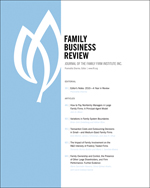Is Nepotism Good or Bad?
 Nepotism is highly controversial in the U.S. business world, yet this widespread, global practice can be absolutely crucial to success for some businesses.
Nepotism is highly controversial in the U.S. business world, yet this widespread, global practice can be absolutely crucial to success for some businesses.
To tell us why and how, Professor Peter Jaskiewicz of the University of Alberta joined Karen Vinton on the Family Business Review podcast to discuss his article “Is Nepotism Good or Bad? Types of Nepotism and Implications for Knowledge Management,” published in the latest issue of FBR and co-authored by Klaus Uhlenbruck, David B. Balkin, and Trish Reay.
 “If we want companies, if we want family businesses to be sustainable in the long term across generations, it’s important to find out how they can do so, and to find out how nepotism can support or threaten sustainability,” said Professor Jaskiewicz, who also shared his findings in a recent issue of Campden Wealth.
“If we want companies, if we want family businesses to be sustainable in the long term across generations, it’s important to find out how they can do so, and to find out how nepotism can support or threaten sustainability,” said Professor Jaskiewicz, who also shared his findings in a recent issue of Campden Wealth.
Click here to play or download the podcast interview, or subscribe on iTunes by following this link.
 Peter Jaskiewicz is an Assistant Professor in Strategic Management and Organization at the University of Alberta School of Business. His research focuses on family businesses, corporate governance, and entrepreneurial processes.
Peter Jaskiewicz is an Assistant Professor in Strategic Management and Organization at the University of Alberta School of Business. His research focuses on family businesses, corporate governance, and entrepreneurial processes.
 Karen L. Vinton, Ph.D., is assistant editor of FBR and a 1999 Barbara Hollander Award winner and Professor Emeritus of Business at the College of Business at Montana State University, where she founded the University’s Family Business Program. An FFI Fellow, she has served on its Board of Directors and chaired the Body of Knowledge committee.
Karen L. Vinton, Ph.D., is assistant editor of FBR and a 1999 Barbara Hollander Award winner and Professor Emeritus of Business at the College of Business at Montana State University, where she founded the University’s Family Business Program. An FFI Fellow, she has served on its Board of Directors and chaired the Body of Knowledge committee.































































































